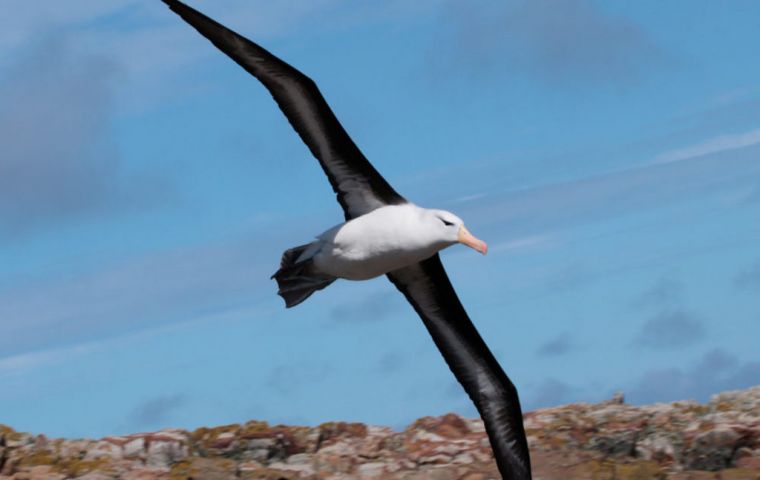MercoPress. South Atlantic News Agency
Falklands Conservation undertakes summer seabirds monitoring program
 Scientists counting and recording the Black browed albatross site
Scientists counting and recording the Black browed albatross site The Falkland Islands support seabird populations that are of global importance, both numerically, and in terms of conservation status, and Falklands Conservation initiated in 1989/90 the Falkland Islands Seabird Monitoring Program (FISMP) in 1989/90.
Falklands Conservtation is currently preparing for the annual summer monitoring program, when far flung colonies are accessed via land, planes and boats, typically taking 8 weeks spread through the summer months with up to 12 staff and volunteers and the support of local landowners.
The initial purpose of FISMP was to monitor the diet and population dynamics of Gentoo Penguin (Pygoscelis papua), Magellanic Penguin (Spheniscus magellanicus), Southern Rockhopper Penguin (Eudyptes c. chrysocome), and Black‐browed Albatross (Thalassarche melanophris) . Diet sampling was discontinued in 2003.
Since then, population monitoring has continued on an annual basis with some changes taking place to the original format, such as the addition and loss of some monitoring sites and the addition of other species.
Currently the FISMP monitors Gentoo Penguin at 11 sites (17 colonies), Southern Rockhopper Penguin and Macaroni Penguin (Eudyptes chrysolophus) at five sites (14 colonies) and Magellanic Penguin at one site (one colony). King Penguin (Aptenodytes patagonicus) and Black‐browed Albatross are monitored at single, but key sites, in terms of population numbers. Southern Giant Petrel (Macronectes giganteus) is monitored at one site (two colonies), Imperial Shag (Phalacrocorax atriceps) at three sites (four colonies) and Brown Skua (Catharacta antarctica) at one site (four colonies).
The program also monitors Magellanic Penguin, Imperial Shag, King Penguin, Southern Giant Petrel and recently Falkland Skua.The changing fortunes of these important Falkland Islands species demonstrate how critical regular monitoring is, not only to give an indication of the general state of seabirds as a whole across the Falklands, but also to identify significant changes that may alter their overall conservation status – and it is easy to see how changes to the Falklands populations can impact the global conservation of these species.
The annual reports are important and help´with long term data, which are the really interesting for assessment of the species conditions. Falklands are home for 72% of Black browed albatross, 43% of Southern Giant Petrel, 30% of Gentoo penguins and 36% of Southern Rockhopper penguins.




Top Comments
Disclaimer & comment rulesCommenting for this story is now closed.
If you have a Facebook account, become a fan and comment on our Facebook Page!